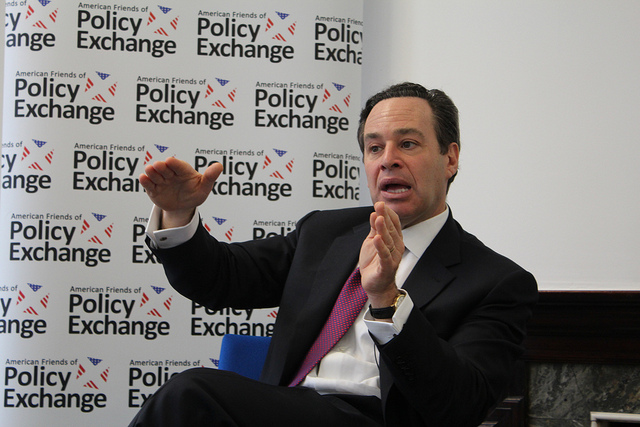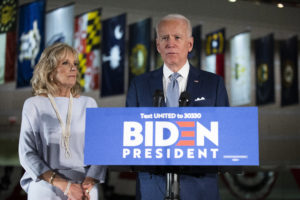Fascism by Another Name
In The Atlantic, David Frum argues that liberals must curtail immigration—or authoritarians will. He’s already chosen his side. David Frum, senior editor of The Atlantic. (Policy Exchange / Flickr)
David Frum, senior editor of The Atlantic. (Policy Exchange / Flickr)
Americans have been easily buffaloed by an English accent ever since the upper crust of that little island started dropping their Rs to sound posh, and mediocre but quotable Brits first sought their fortunes upon our shores. We have no such excuse for David Frum, a Canadian immigrant who moved through a series of conservative publication sinecures, worked for George W. Bush, joined the American Enterprise Institute, got canned from the AEI because he wasn’t mad enough about the Affordable Care Act, and bounced around on a number of projects before landing at The Atlantic.
As a speechwriter for the younger Bush, Frum became famous as the reputed author of the phrase, “Axis of Evil,” which stands alongside Peggy Noonan’s Reagan-era “slipped the surly bonds of Earth”—which she cribbed without attribution from a poem by John Gillespie Magee Jr.—as one of those extremely memorable quotations that evaporates into nonsense if you stare at it for more than a minute. He has since reinvented himself as the character second only to our Oxbridge friends in its ability to boondoggle America’s political and professional classes: the reasonable conservative. The reasonable conservative, as a type, exists to assure liberal and leftist Americans that they must immediately do what the savage hard right most fervently desires, lest those on the savage hard right do it themselves.
In this instance, Frum has decided to expand on the thesis of a 2017 Atlantic article in which he memorably warned that “[w]hen liberals insist that only fascists will defend borders, then voters will hire fascists to do the job liberals won’t do.” He has seen the enemy, and it is the face of a feckless Western liberalism in the face of the “rising tides of color.” He is too fluent in the acceptable language of meritocracy to put it in such crude terms; he can’t say, like the vulgar President he supposedly disdains, that we should reject immigrants from “shithole countries” in favor of an imagined influx of pale Norwegians dissatisfied with the highest human development index in the world.
Instead, he casts about for various acceptable, technocratic fabrics to toss over the moldering taxidermy of xenophobic prejudice, from the merely silly (he seems to believe that those who arrive “speaking Mixtec or Bengali or Fula” are less likely to assimilate—and less likely to be multilingual!—than those who arrived speaking Yiddish or Calabro-Sicilian) to the ahistorical and viciously absurd (he claims new arrivals somehow dilute America’s historic commitment to universal suffrage!).
“If,” David Frum writes in his new cover story for The Atlantic:
you were born in West Africa or Central America to a family not of the ruling elite, you would probably yearn to emigrate. And if your family and friends could stake you the travel costs, you would probably seize the chance. A young person enterprising enough to hazard such a trip would surely contribute in many ways to his or her eventual new home. Almost all of us in North America are descended from somebody who made such a decision, took that risk, and made those contributions.
Now, I don’t have a couple of degrees in history from Yale, as Frum reportedly does, but I cannot imagine this is precisely how the ancestors of most North Americans of West African descent would describe their experience.
Frum’s article already has been savaged for its historical lacunae, its tone-deafness, its factual inaccuracy and lazy editing, and its implicit racism. On the level of simple argument, it’s a mess, moving from complaints about “vast numbers of newcomers” finding not a land of factories and manual labor but rather a “modern knowledge [economy] that [struggles] to achieve full employment and steady wage growth,” before going on to complain that these new arrivals depress the wages of landscapers. He complains that an emphasis on family reunification in immigration law keeps the U.S. from soliciting “more doctors from Nigeria, say, or software engineers from India,” conveniently ignoring the absurd legal, professional and bureaucratic hurdles that meet skilled foreign professionals when they arrive in America.
But I am interested in the contradiction highlighted by the coincidental publication, on the same day as Frum’s long essay appeared, of a detailed New York Times article on the escalating American war in Somalia, a conflict that has been scantly noticed by the American press or American legislators even as it has killed hundreds of people in two dozen airstrikes in January and February of this year alone.
Frum himself is far less vociferous a proponent of neoconservative foreign policy than he once was, having been proved wrong enough times to make Bill Kristol blush. You will no longer see him advocating that we launch effectively simultaneous attacks on North Korea and Iran, as he did in his 2004 duet with Richard Perle, “An End to Evil: How to Win the War on Terror.”
But our war in the Horn of Africa is evidence of the very permanent imperial conflict that Frum and his political allies and benefactors championed from the moment the tragedy of 9/11 presented itself as an opportunity for Washington’s most ghoulish operators. (That is not to say that U.S. history as an imperial power began with Bush, but his presidency was an obvious inflection point for the scope and scale of our military adventurism abroad post-Vietnam.) And as Eric Schmitt and Charlie Savage make clear in their Times reporting, this global conflict has now so metastasized—and Washington’s policy-making apparatus so dithered and shriveled—that distant military commands and perhaps even individual cadres of generals are basically freelancing wars across a vast arc of what David Frum, in his thoughts on immigration, delicately refers to as the “Global South.”
We have garrisoned the world, but we do hope the locals will stay put, thank you very much. I wrote recently that our present historical moment in the United States reminds me of nothing so much as the late Republican period in ancient Rome, when another parochial but expansionist hegemon began to grapple with the political shocks of having acquired, in fits of brutal serendipity, its own expansive archipelago of provinces and client kingdoms. There, too, governments struggled and failed to arrive at “a rational answer to the question of Roman citizenship,” and there, eventually, an older order foundered and gave way to more authoritarian forms.
Ironically, it was ultimately an emperor—Caracalla—who completed the process of Romanization and made all free men in the empire citizens. But this is where we see that Frum is at his most wrong and his most dangerous. He says that liberalism must curtail immigration or we will have fascism. On the contrary. It must ally itself with the left and curtail fascism. It is the only battle it can win. We will have immigration either way, and those who call that the fight of our times are already on the side of the fascists.
Your support matters…Independent journalism is under threat and overshadowed by heavily funded mainstream media.
You can help level the playing field. Become a member.
Your tax-deductible contribution keeps us digging beneath the headlines to give you thought-provoking, investigative reporting and analysis that unearths what's really happening- without compromise.
Give today to support our courageous, independent journalists.









You need to be a supporter to comment.
There are currently no responses to this article.
Be the first to respond.